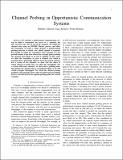| dc.contributor.author | Keslassy, Isaac | |
| dc.contributor.author | Johnston, Matthew Ryan | |
| dc.contributor.author | Modiano, Eytan H | |
| dc.date.accessioned | 2017-12-29T15:27:29Z | |
| dc.date.available | 2017-12-29T15:27:29Z | |
| dc.date.issued | 2017-06 | |
| dc.identifier.issn | 0018-9448 | |
| dc.identifier.issn | 1557-9654 | |
| dc.identifier.uri | http://hdl.handle.net/1721.1/112964 | |
| dc.description.abstract | We consider a multi-channel communication system in which a transmitter has access to M channels, but does not know the state of any of the channels. We model the channel state using an ON/OFF Markov process, and allow the transmitter to probe a single channel at predetermined probing intervals to decide over which channel to transmit. For models in which the transmitter must transmit over the probed channel, it has been shown that a myopic policy probing the channel most likely to be ON is optimal. In this paper, we allow the transmitter to select a channel over which to transmit that is potentially different from the probed channel. For a system of two channels, we show that the choice of which channel to probe does not affect the throughput. For a system with many channels, we show that a probing policy that probes the channel that is the second-most likely to be ON results in higher throughput. We extend the channel probing problem to dynamically choose when to probe based on probing history, and characterize the optimal probing policy for various scenarios. | en_US |
| dc.language.iso | en_US | |
| dc.publisher | Institute of Electrical and Electronics Engineers (IEEE) | en_US |
| dc.relation.isversionof | http://dx.doi.org/10.1109/TIT.2017.2717580 | en_US |
| dc.rights | Creative Commons Attribution-Noncommercial-Share Alike | en_US |
| dc.rights.uri | http://creativecommons.org/licenses/by-nc-sa/4.0/ | en_US |
| dc.source | Prof. Modiano | en_US |
| dc.title | Channel Probing in Opportunistic Communication Systems | en_US |
| dc.type | Article | en_US |
| dc.identifier.citation | Johnston, Matthew, et al. “Channel Probing in Opportunistic Communication Systems.” IEEE Transactions on Information Theory, vol. 63, no. 11, Nov. 2017, pp. 7535–52. | en_US |
| dc.contributor.department | Massachusetts Institute of Technology. Department of Aeronautics and Astronautics | en_US |
| dc.contributor.department | Massachusetts Institute of Technology. Department of Electrical Engineering and Computer Science | en_US |
| dc.contributor.mitauthor | Johnston, Matthew Ryan | |
| dc.contributor.mitauthor | Modiano, Eytan H | |
| dc.relation.journal | IEEE Transactions on Information Theory | en_US |
| dc.eprint.version | Original manuscript | en_US |
| dc.type.uri | http://purl.org/eprint/type/ConferencePaper | en_US |
| eprint.status | http://purl.org/eprint/status/NonPeerReviewed | en_US |
| dspace.orderedauthors | Johnston, Matthew; Keslassy, Isaac; Modiano, Eytan | en_US |
| dspace.embargo.terms | N | en_US |
| dc.identifier.orcid | https://orcid.org/0000-0001-8238-8130 | |
| mit.license | OPEN_ACCESS_POLICY | en_US |
